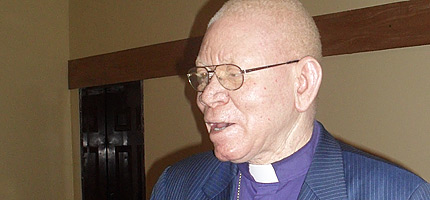© LWF/S. Djobdi
26.03.2010
Namibian Bishop Kameeta Urges Global Lutheran Communion to Uphold Its Unity
Keynote Address at Africa Pre-Assembly Challenges Churches’ Role in Establishing Justice in Society
ABUJA, Nigeria/GENEVA, 26 March 2010 (LWI) – The Lutheran World Federation (LWF) member churches have been challenged to focus on upholding the unity of the global Lutheran communion and on working together to ensure justice for all people in society.
“We must not pride ourselves in the fragmentation, but in our unity. It is only in unity and in nothing else that our strength is anchored,” said Namibian Bishop Dr Zephania Kameeta, when he delivered the keynote address at the 24-28 March Africa Pre-Assembly and Church Leadership Consultation taking place in Abuja, Nigeria.
Kameeta, bishop of the Evangelical Lutheran Church in the Republic of Namibia (ELCRN), is LWF vice president for the African region. His keynote address emphasized the urgency for the global Lutheran communion to act together to ensure justice prevails for the many marginalized people throughout the world. He reflected on the theme of the July 2010 LWF Eleventh Assembly, “Give Us Today Our Daily Bread,” and its relevance for churches in Africa and for the entire LWF.
“Let the communion be communion and let bread be shared among all of us as with the feeding of the 5,000,” said Kameeta in his address on 25 March. He noted that the Eleventh Assembly theme “must result into the reawakening and opening of the eyes of the [Lutheran] communion toward concrete action in our world today.”
Witnesses Today
The “today,” said the ELCRN bishop, emphasizes the urgency of the situation today. He cited the poor living at rubbish dumps, eating whatever they find there. There are also students going to school on empty stomachs, failing to concentrate and eventually dropping out of school and university only to find themselves “on the dark streets of despair and destruction.”
Ensuring bread for all also calls for sustained advocacy in challenging the unjust structures that perpetuate hunger, poverty and despair, and in establishing justice in society, said Kameeta. He challenged churches and their leaders to affirm their role and authority in society by confidently confronting “the world powers” that established these “unjust structures and protect [them] tooth and nail.”
Therefore, noted the LWF vice president, “our calling does not end with organizing a soup kitchen but continues with the observation of mercy and justice in a merciless and unjust world, prophetically challenging the powers of the world in the Name of Lord God of hosts.”
The Eleventh Assembly theme “is a call to the communion of Lutheran churches to stand together and work together for the realization of this prayer for the many in the world. Let this not be postponed for next year or the years to come, but let it happen today. Let justice prevail today,” stressed Kameeta.
On the relevance of the LWF assembly theme for Africa, the ELCRN bishop pointed out that at the Stuttgart assembly the churches on the continent would be witnesses of people “who are denied and robbed of their fundamental human right to daily bread by unjust structures in a world driven by greed and selfish individualistic perception of life. What we bring is not library research and photos about the hungry, the thirsty, the homeless and the naked people, but a living witness from the midst of hunger, thirst and despair.”
Act Locally and Globally
On unity among the African Lutheran churches and the subsequent consequences for the global Lutheran communion, the LWF vice president urged the churches to “stop thinking in terms of sub-regions only, but rather in terms of the whole continent.” He said such unity must be seen in the wider perspective of “our worldwide communion”, and also as proclamation of the prophetic voice calling for the unity of a fragmented and still exploited continent.
He emphasized the need to focus on the potential contribution of individual church representatives to positions of responsibility as delegates to the Assembly, as Council members and in other important LWF positions. Such persons “should not be representing a village somewhere in Africa but the whole continent and they should be able to deal with issues related to our churches and regions, but also to the global LWF,” he said, stressing the need to “think and act locally and globally at the same time.”
Kameeta challenged the African churches to affirm with pride and dignity their contribution to the LWF’s sustainability “without comparing ourselves in self-pity with others. We should stop anything that makes us seen as beggars. What we need is self-confidence, courage, vision and, above all, faith,” he said.
His concluding remarks underscored the responsibility of all LWF member churches in sustaining the Lutheran communion as a gift from God, irrespective of the various issues that the churches were dealing with including that of human sexuality. “Our communion is a gift of God. When divided we weaken it, when united we strengthen it,” added the LWF vice president.
The 90 participants in the Africa pre-assembly include 70 delegates from the 31 LWF members in Africa, representatives of the churches’ mission partners, local ecumenical guests and LWF staff. Plenary and small group deliberations continue today, including presentations of messages from the region’s women and youth representatives.
The two LWF member churches in the West African country—the Lutheran Church of Christ in Nigeria (LCCN) and the Lutheran Church of Nigeria (LCN)—are jointly hosting the LWF regional gathering. (907 words)
Journey | Africa Pre-Assembly Consultation

